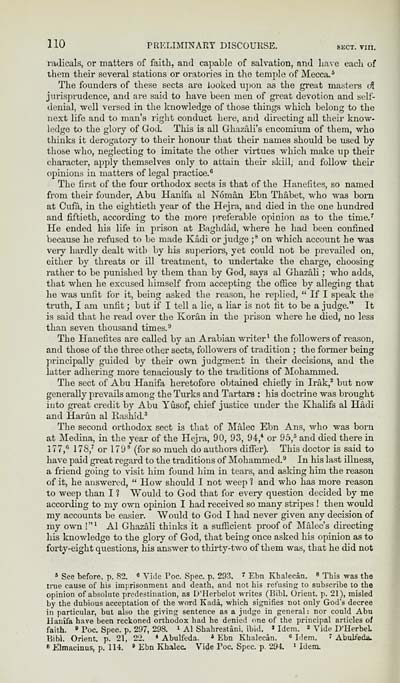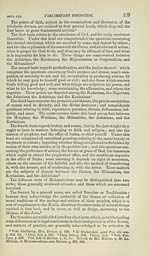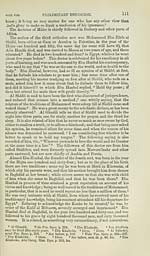Download files
Complete book:
Individual page:
Thumbnail gallery: Grid view | List view

110 PRELIMINARY DISCOURSE. sect. vni.
radicals, or matters of faith, and capable of salvation, and liave each of
thorn their several stations or oratorie.^ in the temple of Mecca.^
The foundei-s of these sects are looked u})on as the gi'eat masters cfl
jurisprudence, and are said to have been men of gi-eat devotion and self-
tlenial, well versed in the knowledge of those things which belong to the
next life and to man's riglit conduct here, and directing all their know-
ledge to the glory of God. This is all Ghazali's encomium of them, who
thinks it derogatoiy to their honour that theii* names should be used by
those who, neglecting to imitate the other virtues which make up their
character, apply them>selves only to attain their skill, and follow their
opinions in mattera of legal practice.^
The first of the four orthodox sects is that of the Hanefites, so named
from their founder, Abu Ilanifa al Noman Ebn Thabet, who was bora
at Cufa, in the eightieth year of the Hejra, and died in the one hundred
and fiftieth, according to the more jireferable opinion as to the time.'
He ended his life in prison at Baghdatl, where he had been confined
because he refused to be made Kadi or judge ;" on which account he was
very hardly dealt with by his superiors, yet could not be prevailed on,
either by threats or ill treatment, to undertake the charge, choosing
rather to be punished by them than by God, says al GhazaU ; who adds,
that when he excused himself from accepting the office by alleging that
he was unfit for it, being asked the reason, he rei)lied, " If I speak the
truth, I am unfit ; but if I tell a lie, a liar is not fit to be a judge." It
is said that he read over the Koran in the prison where he died, no less
than seven thousand times. ^
The Hanefites are called by an Arabian writer^ the followers of reason,
and those of the three other sects, followers of tradition ; the former being
principally guided by their own judgment in their decisions, and the
latter adhering more tenaciously to the traditions of Mohammed.
The sect of Abu Hanifa hei'etofore oVjtained chiefly in Irak,'' but now
generally prevails among the Turks and Tartars : his doctrine was brought
into great credit by Abu Yusof, chief justice under the Khalifs al Hadi
and Hariin al Rashid.^
The second orthodox sect is that of Malec Ebn Ans, who was born
at Medina, in the year of the Hejra, 90, 93, 94,* or 95,^ and died there in
177," 178,' or 179* (for so much do authoi-s diflfer). This doctor is said to
have paid gi-eat regard to the traditions of Mohammed.^ In his last illness,
a friend going to visit him found him in teai's, and asking him the reason
of it, he answered, " How should I not weep 1 and who has more reason
to weep than I ? Would to God that for every question decided by me
according to my own opinion I had received so many stripes ! then would
my accounts be easier. Would to God I had never given any decision of
my own !"' Al GhazaH thinks it a sufiicient proof of Malec's dii-ecting
his knowledge to the gloiy of God, that being once asked his opinion as to
forty-eight questions, his answer to thirty -two of them was, that he did not
* See before, p. 82. « Vide Poc. Spec. p. 293. ^ Ebn Khalecan. ^ This was the
time cause of his imprisonment and death, and not his refusing to subscribe to the
opinion of absolute predestination, as D'Herbelot writes (Bibl. Orient, p. 21), misled
by the dubious acceptation of the word Kada, which signifies not only God"s decree
in particular, but also the giving sentence as a judge in general: nor could Abu
Hanifa have been reckoned orthodox had he denied one of the principal articles of
faith. » Poc. Spec. p. 297, 298. i Al Shahrestani, ibid. > Idem. « Vide D'UerbeL
Bibl. Orient, p. 21, 22. * Abulfeda. * Ebn Kh.^lecan. * Idem. ' Abulfedit
8 Elmacinus, p. 114. » Ebn Kb.ilec. Vide Poc. Spec. p. 294. i Idem.
radicals, or matters of faith, and capable of salvation, and liave each of
thorn their several stations or oratorie.^ in the temple of Mecca.^
The foundei-s of these sects are looked u})on as the gi'eat masters cfl
jurisprudence, and are said to have been men of gi-eat devotion and self-
tlenial, well versed in the knowledge of those things which belong to the
next life and to man's riglit conduct here, and directing all their know-
ledge to the glory of God. This is all Ghazali's encomium of them, who
thinks it derogatoiy to their honour that theii* names should be used by
those who, neglecting to imitate the other virtues which make up their
character, apply them>selves only to attain their skill, and follow their
opinions in mattera of legal practice.^
The first of the four orthodox sects is that of the Hanefites, so named
from their founder, Abu Ilanifa al Noman Ebn Thabet, who was bora
at Cufa, in the eightieth year of the Hejra, and died in the one hundred
and fiftieth, according to the more jireferable opinion as to the time.'
He ended his life in prison at Baghdatl, where he had been confined
because he refused to be made Kadi or judge ;" on which account he was
very hardly dealt with by his superiors, yet could not be prevailed on,
either by threats or ill treatment, to undertake the charge, choosing
rather to be punished by them than by God, says al GhazaU ; who adds,
that when he excused himself from accepting the office by alleging that
he was unfit for it, being asked the reason, he rei)lied, " If I speak the
truth, I am unfit ; but if I tell a lie, a liar is not fit to be a judge." It
is said that he read over the Koran in the prison where he died, no less
than seven thousand times. ^
The Hanefites are called by an Arabian writer^ the followers of reason,
and those of the three other sects, followers of tradition ; the former being
principally guided by their own judgment in their decisions, and the
latter adhering more tenaciously to the traditions of Mohammed.
The sect of Abu Hanifa hei'etofore oVjtained chiefly in Irak,'' but now
generally prevails among the Turks and Tartars : his doctrine was brought
into great credit by Abu Yusof, chief justice under the Khalifs al Hadi
and Hariin al Rashid.^
The second orthodox sect is that of Malec Ebn Ans, who was born
at Medina, in the year of the Hejra, 90, 93, 94,* or 95,^ and died there in
177," 178,' or 179* (for so much do authoi-s diflfer). This doctor is said to
have paid gi-eat regard to the traditions of Mohammed.^ In his last illness,
a friend going to visit him found him in teai's, and asking him the reason
of it, he answered, " How should I not weep 1 and who has more reason
to weep than I ? Would to God that for every question decided by me
according to my own opinion I had received so many stripes ! then would
my accounts be easier. Would to God I had never given any decision of
my own !"' Al GhazaH thinks it a sufiicient proof of Malec's dii-ecting
his knowledge to the gloiy of God, that being once asked his opinion as to
forty-eight questions, his answer to thirty -two of them was, that he did not
* See before, p. 82. « Vide Poc. Spec. p. 293. ^ Ebn Khalecan. ^ This was the
time cause of his imprisonment and death, and not his refusing to subscribe to the
opinion of absolute predestination, as D'Herbelot writes (Bibl. Orient, p. 21), misled
by the dubious acceptation of the word Kada, which signifies not only God"s decree
in particular, but also the giving sentence as a judge in general: nor could Abu
Hanifa have been reckoned orthodox had he denied one of the principal articles of
faith. » Poc. Spec. p. 297, 298. i Al Shahrestani, ibid. > Idem. « Vide D'UerbeL
Bibl. Orient, p. 21, 22. * Abulfeda. * Ebn Kh.^lecan. * Idem. ' Abulfedit
8 Elmacinus, p. 114. » Ebn Kb.ilec. Vide Poc. Spec. p. 294. i Idem.
Set display mode to: Large image | Transcription
Images and transcriptions on this page, including medium image downloads, may be used under the Creative Commons Attribution 4.0 International Licence unless otherwise stated. ![]()
| Early Gaelic Book Collections > J. F. Campbell Collection > Koran: or, Alcoran of Mohammed > (132) |
|---|
| Permanent URL | https://digital.nls.uk/77135547 |
|---|
| Description | Volumes from a collection of 610 books rich in Highland folklore, Ossianic literature and other Celtic subjects. Many of the books annotated by John Francis Campbell of Islay, who assembled the collection. |
|---|
| Description | Selected items from five 'Special and Named Printed Collections'. Includes books in Gaelic and other Celtic languages, works about the Gaels, their languages, literature, culture and history. |
|---|

